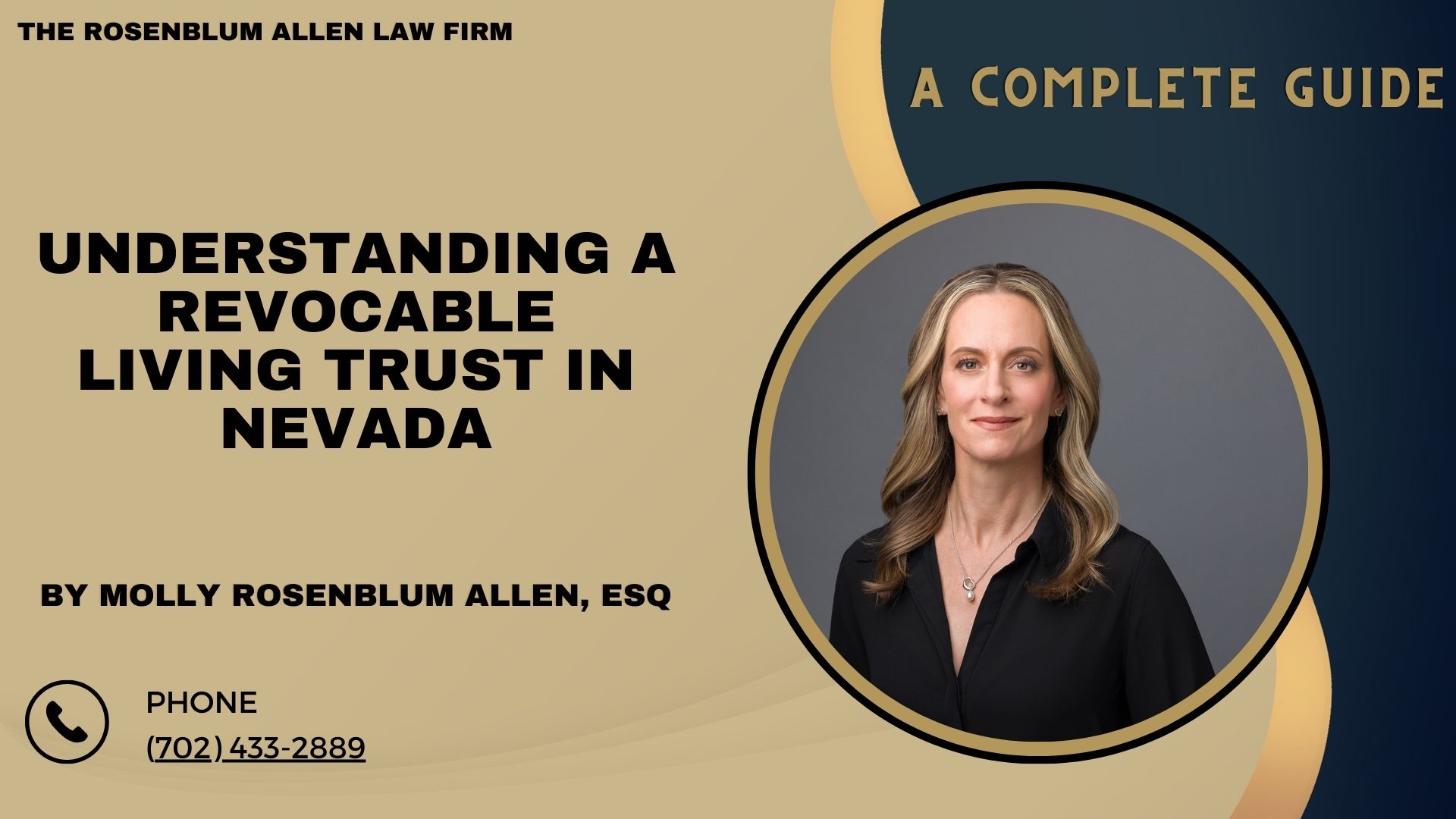When planning for the future, understanding your options is key.
It can make all the difference.
Nevada’s laws protect your assets and loved ones. Setting up a revocable living trust in Nevada can be wise. This guide aims to explain what a revocable living trust is. It covers its advantages and how it is key to estate planning. You may be just starting to think about your estate plan. Or, you may be looking to refine an existing one.
This living trusts in Nevada guide aims to help you understand Nevada’s complex laws.

What is a Revocable Living Trust in Nevada?
Key Features
A revocable living trust is a legal document that you create during your lifetime. Here are its key characteristics:
Ownership Transfer: You can transfer the ownership of your assets into the trust.
Revocable: You retain the ability to amend or revoke the trust at any time.
Control: As the trustee, you manage the assets in the trust, even while alive.
How it Differs from an Irrevocable Trust
Flexibility: Unlike irrevocable trusts, you can change a revocable trust as your situations or wishes change.
Control: You maintain control over the assets with a revocable trust, a feature not available with irrevocable trusts.
Advantages and Disadvantages
Advantages
Avoiding Probate: Assets in the trust bypass the lengthy and costly probate process.
Privacy: The details of the trust remain private, unlike a will which becomes a public record.
Flexibility: Easily amendable as your personal or financial situation changes.
Disadvantages
Upfront Costs: Establishing a trust can be more expensive upfront than drafting a will.
Ongoing Management: The trust requires active management and funding to remain effective.

Establishing a Revocable Living Trust in Nevada
Legal Requirements
To establish a valid trust in Nevada, you must adhere to specific criteria:
Capacity: You must be of sound mind to create a trust.
Intent: A clear intent to create the trust must be expressed.
Trustee Appointment: A trustee must be designated to manage the trust.
Property: The trust must contain property or assets.
Step-by-Step Process
Choosing a Trustee: Decide whether you will serve as your own trustee or appoint someone else.
Determining Beneficiaries: Clearly define who will benefit from the trust after your passing.
Property and Asset Inclusion: Identify and transfer assets into the trust’s name.
Costs and Fees
The costs to set up a revocable living trust in Nevada can vary. They usually range from a few hundred to several thousand dollars. The cost depends on your assets’ complexity. It also depends on if you enlist professional help.
This section of our guide introduces revocable living trusts. It outlines their key features, benefits, and drawbacks. It provides a basic understanding of how to make one in Nevada. As we delve deeper into estate planning, remember the goal. Make sure to manage and distribute your assets as you wish. And, to do this with as little hassle as possible for your loved ones.

The Role of Trusts in Estate Planning
Avoiding Probate
One of the primary reasons many opt for a revocable living trust in Nevada is the ability to avoid probate. Probate is the legal process. It validates a deceased person’s will and distributes their assets. It can be lengthy, public, and costly.
Explanation and Benefits:
Speed: Assets in a trust can be distributed to beneficiaries without the delays of probate.
Privacy: Unlike probated wills, trusts are not made public, keeping your estate affairs private.
Cost Savings: By avoiding probate, the estate can save on the legal fees and court costs associated with the process.
Privacy Considerations
Privacy is a significant concern for many when planning their estate. A revocable living trust offers a level of privacy not available with a will.
Public vs. Private Proceedings:
Wills: Once submitted for probate, a will becomes a public document.
Trusts: Trusts remain private documents, and the distribution of assets can stay out of public records.
Flexibility and Control
A revocable living trust offers unmatched flexibility and control. You can change the trust’s terms. You can add or remove assets. Or, you can dissolve the trust entirely during your lifetime.
Amendments and Revocations:
You have the freedom to adjust your trust as your life circumstances change.
Asset Management During the Grantor’s Lifetime:
As the trustee, you can continue to manage the assets in the trust, ensuring that your estate is handled according to your wishes.

Tax Implications of a Revocable Living Trust in Nevada
Federal Tax Considerations
It’s crucial to understand how a revocable living trust affects your taxes. Generally, during your life, the trust’s assets are treated as your own for tax purposes.
Income Tax: The trust’s income is reported on your tax return.
Estate Tax: For federal estate tax purposes, the assets in the trust are considered part of your estate.
State-Specific Tax Laws
Nevada offers favorable tax laws, making it an attractive location for estate planning.
Nevada Tax Advantages:
No state income tax, including no taxes on income generated by trust assets.
No state estate or inheritance tax, providing significant savings for your heirs.
Revocable Living Trust vs. Will in Nevada
Comparative Analysis
Understanding the differences between a will and a revocable living trust is vital. It is key to effective estate planning.
Legal Standing and Requirements:
Will: Requires probate to validate and execute.
Trust: Operates outside of probate, with immediate effect upon death.
Execution and Administration:
Will: Public administration process.
Trust: Private and often more straightforward process.
Choosing the Right Option for Your Estate
Deciding between a will and a trust depends on your needs, assets, and privacy concerns. A revocable living trust offers more control, privacy, and flexibility. But, it’s essential to weigh the upfront costs and ongoing management duties.
This section expanded our understanding of trusts in estate planning. It covered the tax implications in Nevada and how trusts compare to wills. The goal is not just to prepare for the future. It is to do so in a way that fits your values and situation. This ensures peace of mind for you and your loved ones.

Maintaining and Amending a Revocable Living Trust
Creating a revocable living trust is just the beginning. As your life evolves, so should your trust. It’s not a set-it-and-forget-it document. It needs attention and updates to match your current wishes and circumstances.
Monitoring and Updating Assets
Your trust can only control the assets appropriately transferred into it. As you acquire new assets over time, ensuring they’re titled in the name of the trust is crucial. Here’s a checklist to keep your trust current:
Real Estate: Ensure all properties are titled to the trust.
Bank Accounts: Transfer accounts or open new ones in the name of the trust.
Investment Accounts: Update account ownership to reflect the trust.
Life Events Triggering Revisions
Certain life events warrant a review and possible revision of your trust documents:
Marriage or Divorce: Update your trust to reflect your current marital status and to include or exclude your spouse as a beneficiary.
Birth of Children or Grandchildren: Add any new family members as beneficiaries or establish conditions for their inheritance.
Death of a Beneficiary: Reallocate their portion of the trust to other beneficiaries or a charitable organization, if desired.
Legal Process for Amendments
Amending a revocable living trust is straightforward. The process usually involves drafting an amendment. The amendment outlines the changes. Then, you sign and notarize it. You must consult with an estate planning attorney. They will ensure the amendment is legal and reflects your intentions.

Revocable Living Trust and Incapacity Planning
Many people overlook a key benefit of a revocable living trust. It helps with incapacity planning. If you cannot manage your affairs, your trust can let you pick a successor trustee. They can take control without court intervention.
Designating a Successor Trustee
When you establish your trust, you’ll pick a successor trustee. They will step in if you cannot act due to incapacity. This person should be someone you trust completely. They will manage your assets according to the guidelines you’ve outlined in the trust.
Health Care Directives and Powers of Attorney
Your trust deals with your money and property. But, an estate plan also includes health care directives and powers of attorney.
Health Care Directive: Specify your wishes for medical treatment if you cannot communicate them yourself.
Power of Attorney: Grants someone you trust the authority to make decisions on your behalf, either for health care, financial matters, or both.
Protecting Your Wishes and Assets
These documents ensure that you manage your healthcare and finances as you wish. They provide peace of mind for you and your loved ones.

Common Misconceptions About Revocable Living Trusts
Debunking Myths
Cost Misconceptions: While setting up a trust involves upfront costs, it can save money and headaches for your heirs by avoiding probate and minimizing estate taxes.
Complexity and Accessibility: Trusts may seem complicated, but with the proper guidance, they can be accessible and understandable for anyone, not just the wealthy.
Real Benefits and Limitations: Understanding the advantages and limitations of a revocable living trust ensures you make informed decisions about your estate planning.
Choosing Professional Help
Navigating the intricacies of estate planning and trust management can be daunting. Professionals can help. They can make the process smooth and ensure you structure your trust right.
When to Consult an Estate Planning Attorney
Initial Setup: Ensure all legal requirements are met, and your trust reflects your wishes.
Major Life Changes: Updating your trust following significant changes in your life or the law.
Annual Review: It’s a good practice to review your estate plan annually with a professional to ensure it aligns with your goals.
Evaluating Credentials and Experience
Selecting the right professional is crucial. Look for attorneys specializing in estate planning with experience in Nevada law. Credentials, reviews, and referrals can guide your decision.
The Role of Financial Advisors
Financial advisors can also play a key role in your estate planning. They can help align your financial plan with your estate goals. They can work with your attorney. They will ensure a unified approach to managing your assets now and in the future.
As we continue to navigate estate planning, remember: A living trust is a powerful tool. It helps with managing and sharing assets. It also helps with planning for incapacity. And, with preserving your legacy as you wish.

Breaking It All Down
Estate planning is a deep act of care for your assets. More importantly, it’s for the people and causes you cherish. A revocable living trust is key for an estate plan. This is especially true in Nevada’s favorable legal environment. It offers flexibility, control, and privacy. Traditional wills cannot match it. We’ve explored the basics of trust. We’ve also looked at the details of keeping it and planning for incapacity. The benefits are clear and compelling.
Yet, the journey doesn’t end with the signing of documents. Life is dynamic, and your estate plan should be too. Regular reviews and updates respond to life’s changes. They ensure that your trust reflects your wishes and circumstances. Estate planning might seem hard at first. But, you don’t have to do it alone. Experienced professionals can guide you. They can transform a complex process into a manageable, even empowering one.
By using the principles in this guide, you’re not just organizing your affairs. You’re also securing peace of mind for yourself and your loved ones. The Revocable Living Trust in Nevada isn’t just for giving your assets. It’s a testament to your foresight, love, and commitment to the well-being of those you leave behind. As you plan your estate, remember: each decision reflects your values, work, and legacy.

Frequently Asked Questions
Can I include my minor children as beneficiaries in a revocable living trust?
Yes, you can designate minor children as beneficiaries. However, it’s advisable to appoint a trustee to manage the assets until they reach a specified age.
What happens to my revocable living trust if I relocate from Nevada?
A revocable living trust is generally valid across state lines. Nonetheless, it’s crucial to review and update it to comply with the laws of your new state.
Are assets in a revocable living trust protected from creditors?
While you’re alive, assets in a revocable living trust aren’t shielded from creditors since you maintain control over them. Therefore, creditors may consider them part of your estate for debt repayment.
How does a revocable living trust impact my eligibility for Medicaid?
Assets held in a revocable living trust are counted when determining Medicaid eligibility. This is because you can revoke the trust and access the assets if needed.
Can a revocable living trust hold ownership of a business?
Yes, a revocable living trust can own business interests, simplifying succession planning. This includes shares in a corporation, interests in an LLC, or partnership stakes.
Should I open a separate bank account for my revocable living trust?
Yes, opening bank accounts in the trust’s name helps manage its assets separately from yours, streamlining administration.
What occurs to the revocable living trust after the grantor’s death?
Following the grantor’s death, the trust becomes irrevocable, and a new trustee administers and distributes the trust assets according to its terms.
Can a revocable living trust encompass property located in another country?
Yes, foreign property can be included in a revocable living trust, but it’s essential to consider the laws of the country where the property resides.
How do I transfer assets into a revocable living trust?
Funding a trust involves transferring ownership of assets to it, such as real estate deeds, vehicle titles, and changing beneficiary designations.
Can I appoint more than one trustee for my revocable living trust?
Yes, you can designate multiple trustees to manage the trust, providing checks and balances and ensuring continuity if one trustee is unable to serve.
How does divorce impact a revocable living trust in Nevada?
In the event of divorce, it’s crucial to review and potentially revise the trust, particularly if your former spouse is named as a beneficiary or trustee.
What’s the distinction between a revocable living trust and a power of attorney?
A revocable living trust manages assets and dictates their distribution after death, while a power of attorney grants someone authority to make decisions on your behalf during your lifetime, especially in the event of incapacity.

Glossary
Assets: Items of value owned by an individual or entity. In the context of a trust, these can include real estate, bank accounts, stocks, and personal property.
Beneficiary: An individual or entity designated to receive benefits from a trust, estate, or another financial instrument.
Estate Planning: The process of arranging the management and disposal of a person’s estate during their life and at and after death while minimizing gift, estate, generation-skipping transfer, and income tax.
Grantor (or Settlor or Trustor): The person who creates a trust by transferring assets into it for the benefit of the trust beneficiaries, according to the terms of the trust document.
Incapacity: The inability to manage one’s affairs, either temporarily or permanently, due to physical or mental impairment.
Irrevocable Trust: A type of trust that, once established, cannot be altered, amended, or revoked by the grantor. Upon creating an irrevocable trust, the grantor surrenders control over the assets and the trust.
Medicaid: A joint federal and state program that helps with medical costs for some people with limited income and resources. Medicaid also offers benefits not usually covered by Medicare, like nursing home care and personal care services.
Probate: The legal process through which a deceased person’s will is “proved” in a court and accepted as a valid public document that is the true last testament of the dead.
Revocable Living Trust: A trust that can be altered or terminated during the grantor’s lifetime. The grantor typically retains the ability to control the trust assets and can change its terms at any time.
Successor Trustee: The person or entity named to manage the trust if the original trustee dies, becomes incapacitated, or is otherwise unable to serve.
Trust: A fiduciary arrangement allowing a third party, or trustee, to hold assets on behalf of a beneficiary or beneficiary. Trusts can be arranged in many ways, and the assets can be specified precisely how and when they are passed to the beneficiaries.
Trustee: An individual or institution that holds or manages and invests assets for the benefit of another. The trustee must make all decisions in the best interest of the trust’s beneficiaries.
Will: A legal document that expresses a person’s wishes as to how their property will be distributed after their death and names one or more persons, the executor, to manage the estate until its final distribution.

Additional Resources for You
As you navigate the complexities of estate planning and consider establishing a revocable living trust in Nevada, remember that you’re not alone in this journey. Our lead attorney, Molly Rosenblum Allen, Esq., has created a comprehensive suite of resources to assist you during this critical time. Whether you’re looking for detailed guidance on estate planning, trust creation, or specific tips to optimize your planning strategy, these resources are designed to provide valuable insights and practical advice:
Las Vegas Estate Planning Attorney: A detailed guide offering insights and assistance for all aspects of estate planning in Las Vegas. Explore More
Las Vegas Trust Attorney: Tailored advice and legal services for creating trusts that secure your legacy and protect your loved ones. Learn How
Tips On Estate Planning: Practical tips to help you navigate the estate planning process, ensuring no detail is overlooked. Get Tips
Estate Planning Checklist: A comprehensive checklist to help you organize your estate planning efforts, ensuring a smooth and thorough process. View Checklist
Making A Will: Essential guidance on creating a will, a foundational element of any estate plan. Start Here
Estate Planning Services: An overview of our estate planning services, designed to meet the unique needs of Las Vegas residents. Discover Services
Estate Planning Mistakes: Common pitfalls in estate planning and how to avoid them, ensuring your estate plan is solid and effective. Avoid Mistakes
Estate Planning Probate: Insights into the probate process and how effective estate planning can help minimize its impact. Understand Probate
Las Vegas Asset Protection Attorney: Effective legal advice on protecting your assets, a critical aspect of comprehensive estate planning. Protect Your Assets
Molly Rosenblum Allen, Esq., and the team at The Rosenblum Allen Law Firm are dedicated to providing you with the resources and legal expertise you need to make informed decisions about your estate planning. We encourage you to explore these resources and reach out for personalized advice tailored to your unique situation.

Outside Resources for You
To further enrich your understanding of estate planning and revocable living trusts, especially within the context of Nevada law, here are seven offsite resources that offer valuable information and guidance. These resources can provide additional insights into legal processes, estate planning strategies, and more:
American Bar Association (ABA): A comprehensive resource for legal information, including guidelines on estate planning and trusts. Visit ABA
National Association of Estate Planners & Councils (NAEPC): Offers education and connects professionals in the estate planning field. Explore NAEPC
EstatePlanning.com: Provides useful information on various aspects of estate planning, from basic to advanced strategies. Discover EstatePlanning.com
WealthCounsel: A professional community that provides estate and business planning attorneys with legal document software, education, and a supportive network. Check Out WealthCounsel
ElderLawAnswers: Focuses on elder law and estate planning, offering articles and resources to help navigate these complex areas. Learn More at ElderLawAnswers
FindLaw for the Public: Offers a wealth of free, up-to-date, and easy-to-understand legal information and tools related to estate planning. Visit FindLaw
NOLO: Provides legal information and products for consumers and business owners, covering topics like wills, trusts, and estate planning. Explore NOLO
Each of these resources can serve as a valuable tool in your estate planning journey, offering a wealth of knowledge to help you make informed decisions and plan effectively for the future.

A Special Message from Our Lead Attorney, Molly Rosenblum Allen, Esq

Dear Reader,
Thank you for taking the time to explore our resources on estate planning and revocable living trusts. I hope you’ve found the information enlightening and helpful as you consider the best path forward for your estate planning needs.
At The Rosenblum Allen Law Firm, we understand that every situation is unique, and the decisions you’re making are crucial for your future and the well-being of your loved ones. That’s why my team and I are dedicated to providing personalized, compassionate, and practical legal guidance to help you confidently navigate the complexities of estate planning.
If you’re ready to take the next step or have any questions about how we can assist you, please call us at (702) 433-2889. We can discuss your circumstances and explore the best strategies to meet your estate planning goals.
We’re here to support you in securing your legacy and ensuring peace of mind for you and your family.
Warmest regards,
Molly Rosenblum Allen, Esq.



